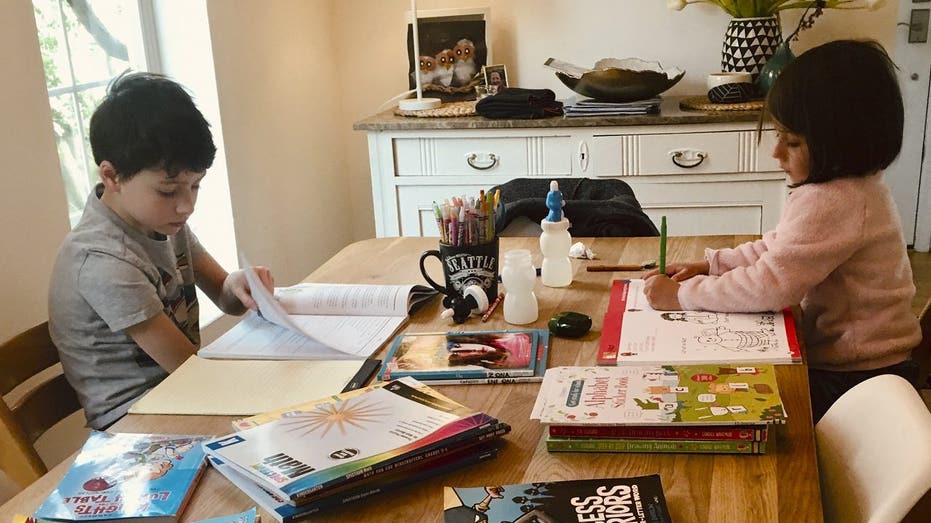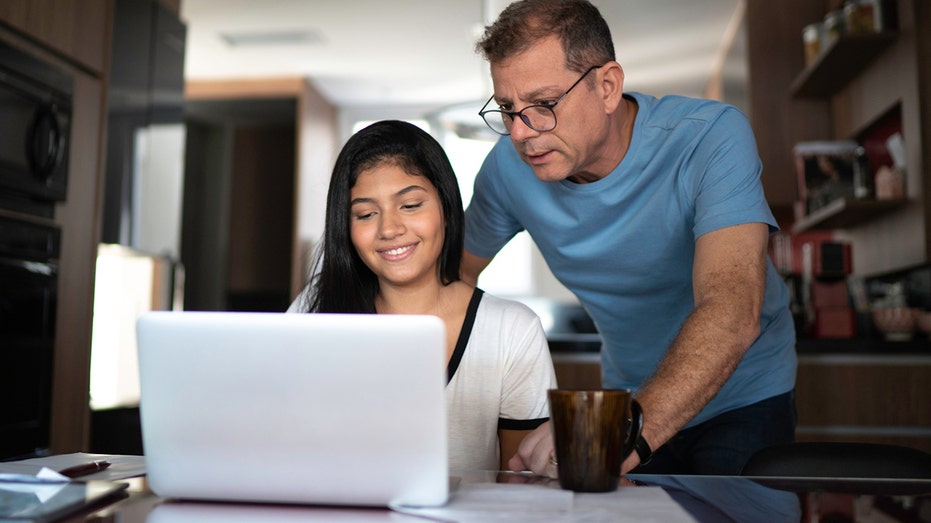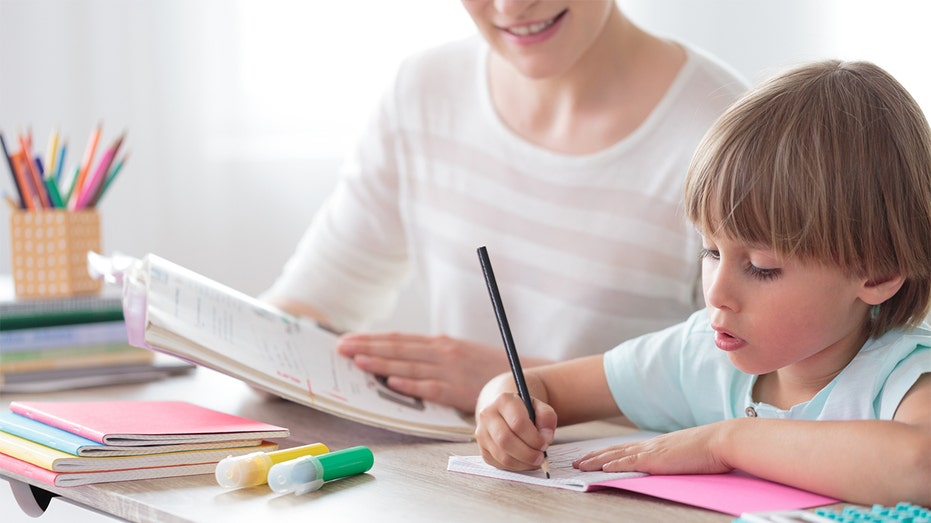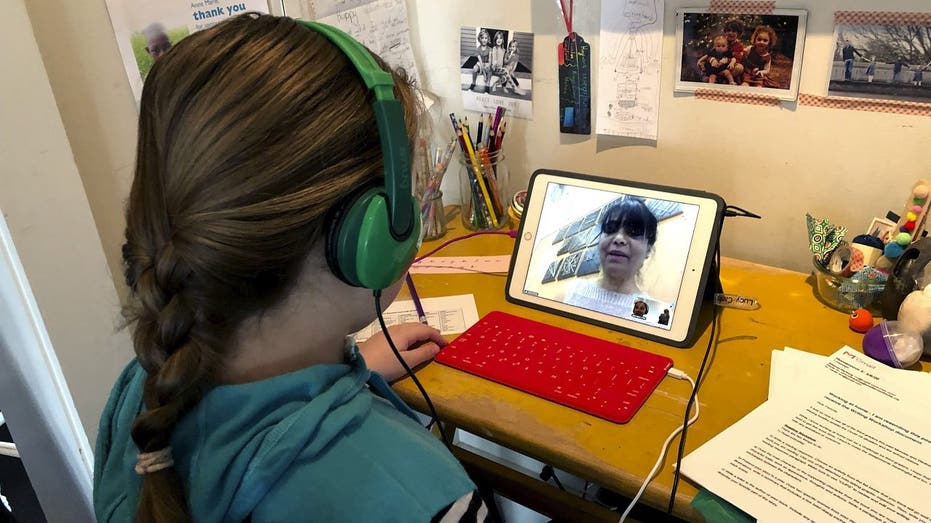10 things parents need to know to homeschool their kids
You’re going to get through it and it’s going to be OK
With the escalation of the coronavirus outbreak, the prospect of extended school closures looms large across the nation. The Centers for Disease Control has suggested it’s likely that shutdowns of a couple of weeks could easily stretch to a month or two.
So, what’s a parent to do?
If you’re intimated with the thought of having to teach or navigate your child’s academics these next few weeks or months, take a big deep breath. Educating kids at home in some form or fashion was once a hallmark of everyday family life in this country.

This photo provided by Natasja Billiau, shows her two children, Victor, 8, and Anna Laura, 5, studying at the kitchen table in their Seattle area home March 12 after their school was shut down for weeks due to the coronavirus. (Natasja Billiau via AP
AS CORONAVIRUS SPREADS, GROCERS FAIL TO KEEP SHELVES STOCKED
You’re going to get through it and it’s going to be OK.
I’ve been homeschooling our boys for the past decade. In fact, I’m hardly alone. According to recent estimates, over 1.7 million children in the United States today are taught within the four walls of home.
Give yourself a lot of grace and give your kids even more. Remember that you're all human. You might get cabin fever but keep going.
You probably don’t have the time to research everything you’re going to need to make the most of these next weeks or months, so here’s a quick cheat sheet for you. Most of these ideas are practical instead of academic.
CORONAVIRUS SCREENINGS JAM US AIRPORTS
I hope this list will make life a little easier for you:
1. Establish a schedule but don’t expect to do school all day long.
We start right after breakfast and normally finish our day at noon or we might come back and do an hour after lunch. Teenagers might need more time because of the nature of their work.
You know how you can often get more done working from home than in your office, free of all the chatter and interruptions? The same is true of homeschooling. It can be very efficient.
2. Give your children several breaks.
Since they’re at home, they’ll feel like they’re at home. Distractions will be everywhere. Their toys are nearby. The PlayStation is one step away.
CORONAVIRUS SLAMS KROGER, WHOLE FOODS, AND OTHER US GROCERY CHAINS
3. Brace yourself for comparisons.
You're going to do it differently than their teachers, and that's OK. Our boys participate in a part-time program with other instructors, and I hear it from them all the time: "But that's not the way Mrs. Peterson does it." Ask them how she does it and then attempt to copy it.

4. Lower your expectations.
Your kids will treat you like their parent, not their teacher.
It’s an old but true adage that we often treat our loved ones worse than outsiders. A parent shouldn’t tolerate a disrespectful child, but our boys are far more likely to challenge or whine to me than they are a teacher outside the home.
GET FOX BUSINESS ON THE GO BY CLICKING HERE
5. Read out loud to your kids every day while they’re home.
While you’re reading, let them play with LEGOS, make friendship bracelets, or draw the scene that is unfolding in the story.

There is something almost magical about reading to kids, an exercise that allows them to expand their imaginations.
6. Take advantage of your public library and resources on the Internet.
We borrow tons of books from the library. As we read, I show them a map and point out the regions where the characters live, or we take a look at pictures on the internet. Sometimes non-fiction books are dry, so a quick web search and a short discussion can hold their interest.

In this photo provided by Anne Marie Canlis, Clementine Canlis, of Seattle, watches an online lecture March 12 after her private school closed for five weeks due to the coronavirus. (Anne Marie Canlis via AP)
If the library is closed pull up your favorite eBook app. The choices are endless. Our boys, two of whom are severely dyslexic, benefit from audiobooks, story podcasts, and read alouds on our local, library app. If you need some ideas, send me a Tweet @JulieBatura.
7. Remember that all of your community is a classroom.
Quarantines may limit access to certain venues, but as the spring breaks, get outside and explore nature. Go for a short walk, take a long hike, or discover something new.
8. Don’t think you have to cover every subject, every day.
Keep it interesting and surprise them from time to time. Kids may revel in routine but they also rebel if forced into ruts.
9. Let your older children do their thing.
Use this unique season as an opportunity to give them some freedom and develop responsibility. They probably won’t need you as much you think they will need you.
HOW TO SUPPORT LOCAL BUSINESS DURING CORONAVIRUS PANDEMIC
I always check up on our oldest son’s assignments (he’s in 9th grade) and make sure they’re complete. But I don’t hover over like a vulture. Assure them you’re there to help whenever they need some guidance. And a big hug and a few words of encouragement can give them what they need to push through a difficult assignment.
10. Give yourself a lot of grace and give your kids even more.
Remember that you’re all human. You might get cabin fever, but keep going. You will get through this, and maybe in the end, you’ll have found new ways to help with homework and discovered new ideas for after school. You may also rediscover some of the many things you forgot that you loved about your children.
This current crisis will pass, and when it’s all over, your kids will return to school with a new appreciation for their teachers – and you’ll hopefully have a new appreciation for them, too.
Julie Hamilton Batura is a mom, homeschool teacher and recovering oboist. She resides in Colorado Springs and can be reached via Twitter @JulieBatura.





















